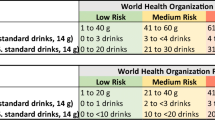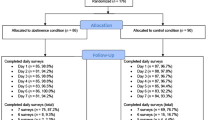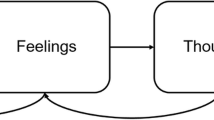Abstract
Rationale
Quantitative real-time data on the stress experienced by drug misusers in their daily lives may provide additional insight into stress’s role in drug use.
Objective
The purpose of this study is to evaluate stress in relation to craving, mood, relapse-trigger exposure, and cocaine use in cocaine-dependent outpatients.
Methods
Methadone-maintained cocaine- and heroin-abusing outpatients (N = 114) provided ecological momentary assessment data on handheld computers. Ratings of stress were compared to those of craving and mood and past-hour exposure to putative drug-use triggers in randomly prompted entries and in the 5 h prior to participant-initiated cocaine use reports.
Results
Stress had significant positive relationships with current ratings of craving for cocaine, heroin, and tobacco and with ratings of tiredness, boredom, and irritation, and had significant negative relationships with ratings of happiness and relaxation. Stress was significantly greater in entries in which participants also reported past-hour exposure to negative-mood triggers, most of the drug-exposure triggers, or any trigger involving thoughts about drugs (e.g., tempted out of the blue). The linear increase in stress during the 5-h preceding individual episodes of cocaine use was not significant (p = 0.12), though there was a trend for such an increase before the use episodes that participants attributed to stressful states when they occurred (p = 0.87).
Conclusions
The findings suggest a complex role of stress in addiction. Stress reported in real time in the natural environment showed strong cross-sectional momentary relationships with craving, mood, and exposure to drug-use trigger. However, the prospective association between stress ratings and cocaine-use episodes was, at best, weak.



Similar content being viewed by others
Notes
In this paper, we use the term mood synonymously with affect to refer to a transient feeling state (Watson 2000). Some authors distinguish mood from affect, but the distinction varies among authors.
Denominator degrees of freedom were expressed in rounded exponential form (“27E3”) in the SAS Proc Mixed output.
References
Ariely D (1998) Combining experiences over time: the effects of duration, intensity changes and on-line measurements on retrospective pain evaluations. J Behav Decis Mak 11:19–45
Back SE, Hartwell K, DeSantis SM, Saladin M, McRae-Clark AL, Price KL, Moran-Santa Maria MM, Baker NL, Spratt E, Kreek MJ, Brady KT (2010) Reactivity to laboratory stress provocation predicts relapse to cocaine. Drug Alcohol Depend 106:21–27
Brady KT, McRae AL, Moran-Santa Maria MM, DeSantis SM, Simpson AN, Waldrop AE, Back SE, Kreek MJ (2009) Response to corticotropin-releasing hormone infusion in cocaine-dependent individuals. Arch Gen Psychiatry 66:422–430
Briand LA, Blendy JA (2010) Molecular and genetic substrates linking stress and addiction. Brain Res 1314:219–234
Buchmann AF, Laucht M, Schmid B, Wiedemann K, Mann K, Zimmermann US (2010) Cigarette craving increases after a psychosocial stress test and is related to cortisol stress response but not to dependence scores in daily smokers. J Psychopharmacol 24:247–255
Colamussi L, Bovbjerg DH, Erblich J (2007) Stress- and cue-induced cigarette craving: effects of a family history of smoking. Drug Alcohol Depend 88:251–258
Daughters SB, Richards JM, Gorka SM, Sinha R (2009) HPA axis response to psychological stress and treatment retention in residential substance abuse treatment: a prospective study. Drug Alcohol Depend 105:202–208
Elman I, Lukas SE, Karlsgodt KH, Gasic GP, Breiter HC (2003) Acute cortisol administration triggers craving in individuals with cocaine dependence. Psychopharmacol Bull 37:84–89
Epstein DH, Marrone GF, Heishman SJ, Schmittner J, Preston KL (2010) Tobacco, cocaine, and heroin: craving and use during daily life. Addict Behav 35:318–324
Epstein DH, Preston KL (2010) Daily life hour by hour, with and without cocaine: an ecological momentary assessment study. Psychopharmacology 211(2):223–232
Epstein DH, Willner-Reid J, Vahabzadeh M, Mezghanni M, Lin JL, Preston KL (2009) Real-time electronic diary reports of cue exposure and mood in the hours before cocaine and heroin craving and use. Arch Gen Psychiatry 66:88–94
Folkman S (1997) Positive psychological states and coping with severe stress. Soc Sci Med 45:1207–1221
Folkman S (2008) The case for positive emotions in the stress process. Anxiety Stress Coping 21:3–14
Hamidovic A, Childs E, Conrad M, King A, de Wit H (2010) Stress-induced changes in mood and cortisol release predict mood effects of amphetamine. Drug Alcohol Depend 109:175–180
Heather N, Stallard A, Tebbutt J (1991) Importance of substance cues in relapse among heroin users: comparison of two methods of investigation. Addict Behav 16:41–49
Hyman SM, Fox H, Hong KI, Doebrick C, Sinha R (2007) Stress and drug-cue-induced craving in opioid-dependent individuals in naltrexone treatment. Exp Clin Psychopharmacol 15:134–143
Jobes ML, Ghitza UE, Epstein DH, Phillips KA, Heishman SJ, Preston KL (2010) Effects of clonidine on cocaine craving in response to stress- and drug-related scripts. American College of Clinical Pharmacology, Baltimore
Koob GF (2009) Brain stress systems in the amygdala and addiction. Brain Res 1293:61–75
Larsen JT, McGraw AP, Cacioppo JT (2001) Can people feel happy and sad at the same time? J Pers Soc Psychol 81:684–696
Marlatt GA, Gordon JRE (1985) Relapse prevention: maintenance strategies in the treatment of addictive behaviors. Guilford, New York
Preston KL, Vahabzadeh M, Schmittner J, Lin JL, Gorelick DA, Epstein DH (2009) Cocaine craving and use during daily life. Psychopharmacology 207:291–301
Robins LN, Cottler LB, Bucholz KK, Compton WM III (1995) The diagnostic interview schedule, version IV. Washington University, St. Louis
Shiffman S, Hufford M, Hickcox M, Paty JA, Gnys M, Kassel JD (1997) Remember that? A comparison of real-time versus retrospective recall of smoking lapses. J Consult Clin Psychol 65:292–300
Shiffman S, Paty J (2006) Smoking patterns and dependence: contrasting chippers and heavy smokers. J Abnorm Psychol 115:509–523
Shiffman S, Stone AA, Hufford MR (2008) Ecological momentary assessment. Annu Rev Clin Psychol 4:1–32
Shiffman S, Waters AJ (2004) Negative affect and smoking lapses: a prospective analysis. J Consult Clin Psychol 72:192–201
Sinha R, Catapano D, O'Malley S (1999) Stress-induced craving and stress response in cocaine dependent individuals. Psychopharmacology 142:343–351
Sinha R, Fuse T, Aubin LR, O'Malley SS (2000) Psychological stress, drug-related cues and cocaine craving. Psychopharmacology 152:140–148
Sinha R, Garcia M, Paliwal P, Kreek MJ, Rounsaville BJ (2006) Stress-induced cocaine craving and hypothalamic-pituitary-adrenal responses are predictive of cocaine relapse outcomes. Arch Gen Psychiatry 63:324–331
Sinha R, Kimmerling A, Doebrick C, Kosten TR (2007) Effects of lofexidine on stress-induced and cue-induced opioid craving and opioid abstinence rates: preliminary findings. Psychopharmacology 190:569–574
Sutton S (1993) Is wearing clothes a high risk situation for relapse? The base rate problem in relapse research. Addiction 88:725–727
Uhart M, Wand GS (2009) Stress, alcohol and drug interaction: an update of human research. Addict Biol 14:43–64
Vahabzadeh M, Epstein DH, Mezghanni M, Lin J-L, Preston KL (2004) An electronic diary software for ecological momentary assessment (EMA) in clinical trials. In: Proceedings of the 17th IEEE symposium on computer-based medical systems (CBMS), 24–25 June 2004, Bethesda, MD, USA, pp 167–172
Watson D (2000) Chapter 3. Situational and environmental influences on mood. In: Mood and Temperament. Guilford Press, New York, pp 62–103
Acknowledgments
This research was supported by the Intramural Research Program (IRP) of the National Institute on Drug Abuse (NIDA), National Institutes of Health. We wish to thank the NIDA IRP Archway Clinic staff for data collection.
Financial disclosures/conflicts of interest
None to declare.
Author information
Authors and Affiliations
Corresponding author
Additional information
Funding/support
This research was supported by the NIDA Intramural Research Program and Genes and Environment Initiative Cooperative Agreement Z01-DA000499.
Rights and permissions
About this article
Cite this article
Preston, K.L., Epstein, D.H. Stress in the daily lives of cocaine and heroin users: relationship to mood, craving, relapse triggers, and cocaine use. Psychopharmacology 218, 29–37 (2011). https://doi.org/10.1007/s00213-011-2183-x
Received:
Accepted:
Published:
Issue Date:
DOI: https://doi.org/10.1007/s00213-011-2183-x




